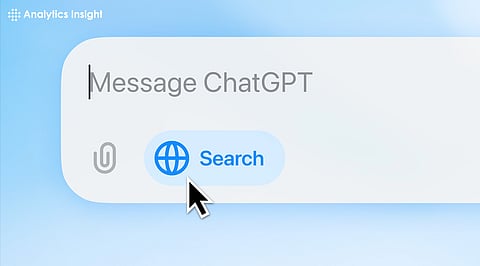

The internet has long been dominated by Google, a major company that has established its authority in online searches. However, a new contender, ChatGPT, is entering the arena. By utilizing advanced AI technology, ChatGPT offers users a fresh approach to online searching. Now, people must consider whether this new option can compete with the well-established presence of Google.
The OpenAI language processing technology powers search in ChatGPT. Rather than a list of links, users are given conversational and direct answers to their questions in search in ChatGPT. The innovation represents a combination of deep learning and a natural understanding of the language to provide almost human-like responses. Such an approach emphasizes the need to make information concise, accurate, and contextual, with the desire to eliminate most of the pain points people may have in traditional search engines.
The most defining characteristic of ChatGPT search is that it is conversational. It saves the users from the bother of searching multiple web pages to get an answer. Upon receiving a question, the system responds with the most simple and direct language possible. This conversation interaction gives an intuitive feel to the user, especially those who value time and efficiency.
It also gives nuanced answers, so it's very easy to ask complicated questions that normally involve deep digging through many different websites. The ability of the AI to understand nuances and context makes it good at answering questions that involve depth or layers.
For over two decades, Google has been the benchmark online search platform. Providing the right results at record speeds due to comprehensive algorithms combined with an index that is enormous in scale about web pages, Google complements the search capabilities in a way that includes features such as predictive text, image search, and voice queries.
This integration with such an established ecosystem by Google that just works fluently across platforms like Gmail, Google Maps, and YouTube makes it a really strong competitor in the space of tech.
Although dominant, Google's traditional approach to presenting search results has been criticized. Relying on ads and occasionally giving more importance to sponsored content than organic results frustrates users. In addition, finding specific answers typically requires multiple clicks and further exploration, which is often a time-consuming process.
ChatGPT Search does its best to provide very fast, conversational answers. It will save users who want easy answers from time and trouble. The AI model is very good for specific searches, creative ideas, and learning.
However, the depth and breadth of ChatGPT Search pale compared to Google. Its training data is only good for what it is, possibly not current and certainly not anything close to all-inclusive. On the other hand, Google has web crawling power that guarantees the freshest from the most diverse sources.
Google’s robust ecosystem and established trust among users make it a tough competitor to displace. Features such as Google Scholar for academic searches, Google Images for visual content, and the Knowledge Graph for rich snippets provide unmatched versatility. ChatGPT Search is innovative but lacks those other additional tools.
With the integration of ChatGPT Search, how people acquire information retrieval techniques has changed. It forms a step towards the most customized and interactive experiences in search, especially among professionals, students, or anyone seeking the most accurate answers quickly in an alternative way.
It is expected to shift the competition into the innovations to be built at the research level in terms of searching. Further, AI advancements boost Google's search engines, so it introduces natural models similar to ChatGPT. Which may lead to better usability or various other features sometime from now.
This could become the rule—the coexistence of all kinds of search engines be it traditional or AI power. Each one serves different needs. Google contains very exhaustive resources; on the other hand, its conversational and user-friendly cousin is ChatGPT Search. The choice will depend much on individual preferences and exactly on the requirements of a question. This gap can be reduced further with further developments in AI technology. However, ChatGPT Search will continue to be able to innovate its offerings, while Google's innovation will probably keep it on top for a long time.
ChatGPT Search is going to reveal the power of AI in changing the face of things in the digital world. The gold standard for web search happens to be Google, and the alternative options are rising fast with alternatives such as ChatGPT Search. It can only be told with the help of time if these two will complement each other or try to fight for the number one spot. However, the future of search engines does look brighter than ever now.
